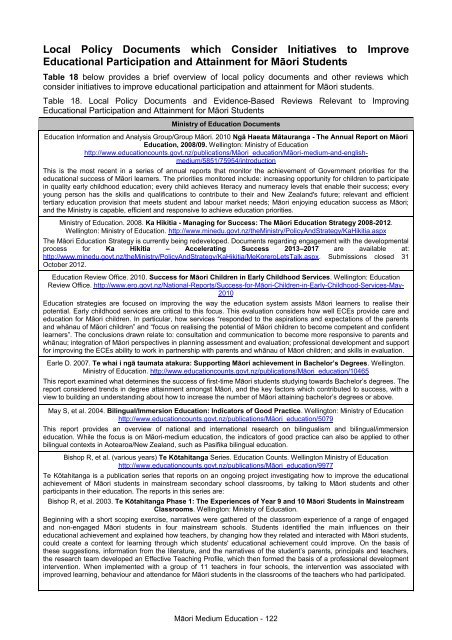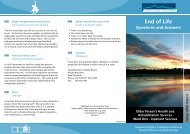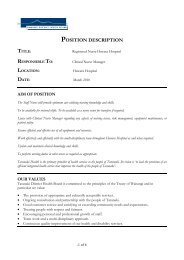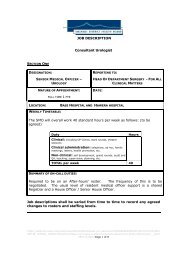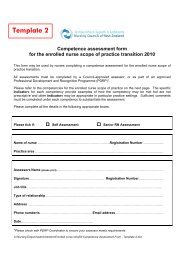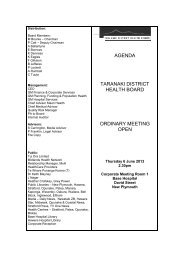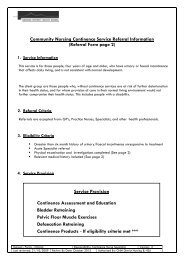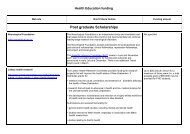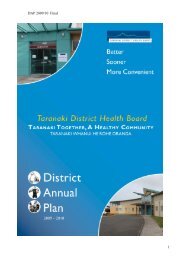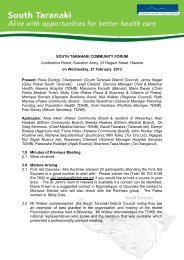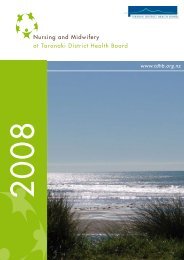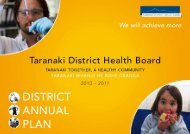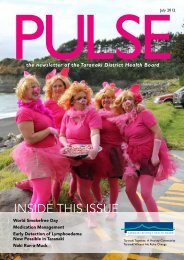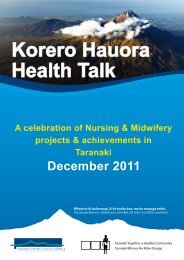This annual report - Taranaki District Health Board
This annual report - Taranaki District Health Board
This annual report - Taranaki District Health Board
- No tags were found...
Create successful ePaper yourself
Turn your PDF publications into a flip-book with our unique Google optimized e-Paper software.
Local Policy Documents which Consider Initiatives to ImproveEducational Participation and Attainment for Māori StudentsTable 18 below provides a brief overview of local policy documents and other reviews whichconsider initiatives to improve educational participation and attainment for Māori students.Table 18. Local Policy Documents and Evidence-Based Reviews Relevant to ImprovingEducational Participation and Attainment for Māori StudentsMinistry of Education DocumentsEducation Information and Analysis Group/Group Māori. 2010 Ngā Haeata Mātauranga - The Annual Report on MāoriEducation, 2008/09. Wellington: Ministry of Educationhttp://www.educationcounts.govt.nz/publications/Māori_education/Māori-medium-and-englishmedium/5851/75954/introduction<strong>This</strong> is the most recent in a series of <strong>annual</strong> <strong>report</strong>s that monitor the achievement of Government priorities for theeducational success of Māori learners. The priorities monitored include: increasing opportunity for children to participatein quality early childhood education; every child achieves literacy and numeracy levels that enable their success; everyyoung person has the skills and qualifications to contribute to their and New Zealand's future; relevant and efficienttertiary education provision that meets student and labour market needs; Māori enjoying education success as Māori;and the Ministry is capable, efficient and responsive to achieve education priorities.Ministry of Education. 2008. Ka Hikitia - Managing for Success: The Māori Education Strategy 2008-2012.Wellington: Ministry of Education. http://www.minedu.govt.nz/theMinistry/PolicyAndStrategy/KaHikitia.aspxThe Māori Education Strategy is currently being redeveloped. Documents regarding engagement with the developmentalprocess for Ka Hikitia – Accelerating Success 2013–2017 are available at:http://www.minedu.govt.nz/theMinistry/PolicyAndStrategy/KaHikitia/MeKoreroLetsTalk.aspx. Submissions closed 31October 2012.Education Review Office. 2010. Success for Māori Children in Early Childhood Services. Wellington: EducationReview Office. http://www.ero.govt.nz/National-Reports/Success-for-Māori-Children-in-Early-Childhood-Services-May-2010Education strategies are focused on improving the way the education system assists Māori learners to realise theirpotential. Early childhood services are critical to this focus. <strong>This</strong> evaluation considers how well ECEs provide care andeducation for Māori children. In particular, how services “responded to the aspirations and expectations of the parentsand whānau of Māori children” and “focus on realising the potential of Māori children to become competent and confidentlearners”. The conclusions drawn relate to: consultation and communication to become more responsive to parents andwhānau; integration of Māori perspectives in planning assessment and evaluation; professional development and supportfor improving the ECEs ability to work in partnership with parents and whānau of Māori children; and skills in evaluation.Earle D. 2007. Te whai i ngā taumata atakura: Supporting Māori achievement in Bachelor’s Degrees. Wellington.Ministry of Education. http://www.educationcounts.govt.nz/publications/Māori_education/10465<strong>This</strong> <strong>report</strong> examined what determines the success of first-time Māori students studying towards Bachelor’s degrees. The<strong>report</strong> considered trends in degree attainment amongst Māori, and the key factors which contributed to success, with aview to building an understanding about how to increase the number of Māori attaining bachelor’s degrees or above.May S, et al. 2004. Bilingual/Immersion Education: Indicators of Good Practice. Wellington: Ministry of Educationhttp://www.educationcounts.govt.nz/publications/Māori_education/5079<strong>This</strong> <strong>report</strong> provides an overview of national and international research on bilingualism and bilingual/immersioneducation. While the focus is on Māori-medium education, the indicators of good practice can also be applied to otherbilingual contexts in Aotearoa/New Zealand, such as Pasifika bilingual education.Bishop R, et al. (various years) Te Kōtahitanga Series. Education Counts. Wellington Ministry of Educationhttp://www.educationcounts.govt.nz/publications/Māori_education/9977Te Kōtahitanga is a publication series that <strong>report</strong>s on an ongoing project investigating how to improve the educationalachievement of Māori students in mainstream secondary school classrooms, by talking to Māori students and otherparticipants in their education. The <strong>report</strong>s in this series are:Bishop R, et al. 2003. Te Kōtahitanga Phase 1: The Experiences of Year 9 and 10 Māori Students in MainstreamClassrooms. Wellington: Ministry of Education.Beginning with a short scoping exercise, narratives were gathered of the classroom experience of a range of engagedand non-engaged Māori students in four mainstream schools. Students identified the main influences on theireducational achievement and explained how teachers, by changing how they related and interacted with Māori students,could create a context for learning through which students' educational achievement could improve. On the basis ofthese suggestions, information from the literature, and the narratives of the student’s parents, principals and teachers,the research team developed an Effective Teaching Profile, which then formed the basis of a professional developmentintervention. When implemented with a group of 11 teachers in four schools, the intervention was associated withimproved learning, behaviour and attendance for Māori students in the classrooms of the teachers who had participated.Māori Medium Education - 122


